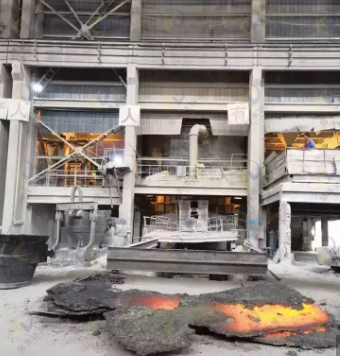
Calcium cored wire is a versatile tool widely used in the steelmaking industry for various applications. Its unique properties make it an indispensable component in processes such as desulfurization, deoxidation, and inclusion modification. This article delves into the diverse applications of calcium cored wire, highlighting its significant contributions to different aspects of steel production.
Calcium cored wire plays a crucial role in desulfurization, removing sulfur from molten steel. The wire introduces calcium into the melt, forming calcium sulfide (CaS). This compound rises to the surface and can be easily removed as slag, reducing the sulfur content in the final steel product. Desulfurization enhances the purity and mechanical properties of the steel, resulting in higher-quality end products.
In the deoxidation process, calcium cored wire acts as a powerful deoxidizer. It releases calcium vapor, which reacts with oxygen in the molten steel to form calcium oxide (CaO) or calcium aluminate (CaAl2O4). These oxides bind with impurities and form slag, effectively removing oxygen from the steel. Deoxidation ensures the integrity of the steel by preventing the formation of unwanted oxides, resulting in improved mechanical properties.
Calcium cored wire aids in inclusion modification, a critical process in steelmaking. Inclusions are non-metallic impurities that can impact the steel's properties. The introduction of calcium alters the composition of inclusions, improving their morphology and making them easier to remove during the refining process. Inclusion modification enhances the steel's mechanical properties, ductility, and resistance to fatigue and corrosion.

Calcium cored wire is utilized for alloying purposes, allowing the introduction of specific alloying elements into the steel. Calcium-based alloys, such as calcium-silicon (CaSi) or calcium-manganese (CaMn), are added to achieve desired properties. These alloying elements enhance strength, hardness, and corrosion resistance, tailoring the steel's performance to meet specific industry requirements.
Microalloying, the addition of small amounts of specific elements, is another application of calcium cored wire. Calcium-based microalloying wires containing elements like boron, titanium, or niobium are used to refine grain size and control the precipitation of certain phases during solidification. Microalloying allows for the production of lighter and stronger steel with improved mechanical properties.
Apart from steelmaking, calcium cored wire finds applications in the treatment of molten aluminum. The addition of calcium to liquid aluminum removes impurities, enhances fluidity, and reduces casting defects. This treatment is essential in industries like automotive manufacturing, where high-quality aluminum components are required.
Calcium cored wire plays a vital role in various applications within the steelmaking industry. Its versatility and effectiveness in desulfurization, deoxidation, inclusion modification, alloying, microalloying, and calcium treatment contribute to the production of high-quality steel and aluminum products. By harnessing the benefits of calcium cored wire, steel manufacturers can achieve superior steel quality, improved mechanical properties, and enhanced performance in diverse applications.

Write a Message